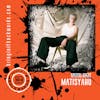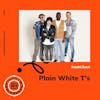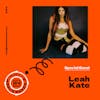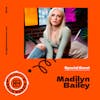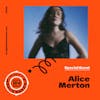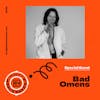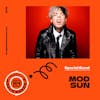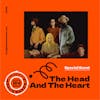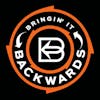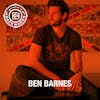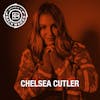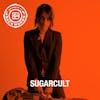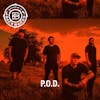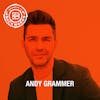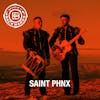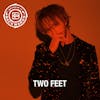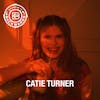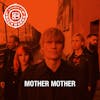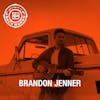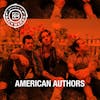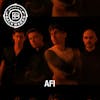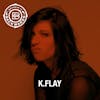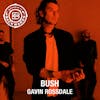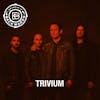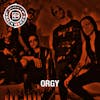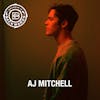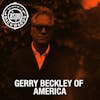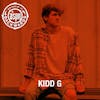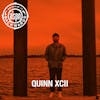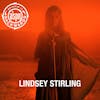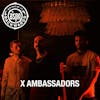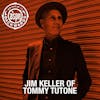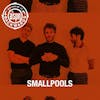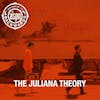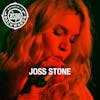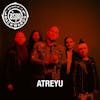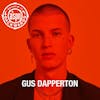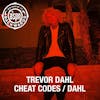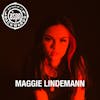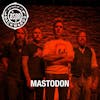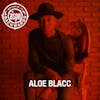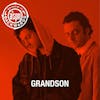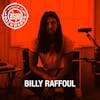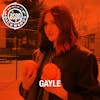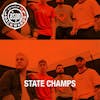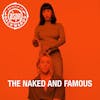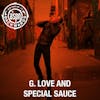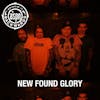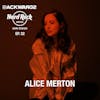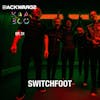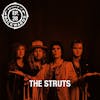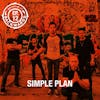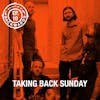Interview with Miles Francis
We had the pleasure of interviewing Miles Francis over Zoom video!
New York City singer, songwriter & multi-instrumentalist Miles Francis releases their transformative album Good Man, announcing a hometown New York show at Sultan Room on April 27....
We had the pleasure of interviewing Miles Francis over Zoom video!
New York City singer, songwriter & multi-instrumentalist Miles Francis releases their transformative album Good Man, announcing a hometown New York show at Sultan Room on April 27. Sharing the final single & video for “Rainjacket” this week, Miles’ experiences during the project helped them come out as non-binary, resulting in works of gorgeous paradox: nuanced explorations of masculinity and all its trappings, presented in a sound that’s joyfully unfettered.
Playing into the album’s themes and storyline are previous singles “Popular” (feat. Lizzie Loveless & Lou Tides, formerly of TEEN), “Let Me Cry,” “Nature” & “Service,” complete with mesmerizing boy band clone choreography that mirrors Miles' own recording process in quarantine. “Everyone indulges in having an ego and wanting to be recognized, but men seem particularly bent on the power element — whether it’s taking up space in a room or leading a country,” says Francis. These were followed by remixes of "Popular" by Future Generations and “Service” from Overcoats, to love from KCRW, Earmilk, The Wild Honey Pie & beyond.
Produced by Francis and recorded in their longtime studio (located in the basement of the Greenwich Village building they grew up in), Good Man arrives as the most visionary and elaborately realized output yet from a polymathic artist known for collaborating with the likes of Angélique Kidjo, Sharon Jones & The Dap-Kings, and Arcade Fire’s Will Butler.
We want to hear from you! Please email Tera@BringinitBackwards.com.
www.BringinitBackwards.com
#podcast #interview #bringinbackpod #MilesFrancis #GoodMan #NewMusic #zoom
Listen & Subscribe to BiB
https://www.bringinitbackwards.com/follow/
Follow our podcast on Instagram and Twitter!
https://www.facebook.com/groups/bringinbackpod
We'd love to see you join our BiB Facebook Group.
5 (1m 27s): Hello. It is Adam. Welcome back to bringing it backwards. A podcast where both legendary and rising artists tell their own personal stories of how they achieved stardom. On this episode, we had a chance to hang out with Myles Francis over zoom video, Myles was born and raised in New York city and talks about how they got into music. Myles comes from a musical family. Their dad was in bands as a trumpet player and singer Myles. His mom is just a music fanatic. Myles started playing drums at six years old, around 10 started to play the guitar and bass. And while in high school started a couple of bands where they were the singer songwriter, and also in other bands as the drummer miles' attended, NYU went to school for, for drumming, jazz drumming ended up landing a gig with a band opening up for arcade fire on a bunch of tours through that miles met will Butler, who is the keyboard player for arcade fire miles joined Will's solo project band toured with will for a long time. 5 (2m 33s): And in the van while on tour with will Butler is when miles Francis the solo project began miles talked about putting out the swimmers EAP, which followed up by doves. All those songs written around the same time period that miles was touring with will Butler miles also tells us all about the new record, which is coming out called Goodman, the music video concepts, the cover of the records concept. It all kind of flows together. So we find out all about miles and the new record. Good man. You can watch our interview with miles Francis on our Facebook page and YouTube channel at bringing it backwards. 5 (3m 16s): It'd be rad if you subscribe to our channel like us on Facebook, follow us on Instagram, Twitter, and Tik TOK at bringing back pod. And if you're listening to this on either apple music, Google podcasts, wherever you listen to podcasts, Spotify, it'd be awesome. If you follow us there as well and hook us up with a five-star view would be amazing. 6 (3m 38s): We'd appreciate your support. If you follow and subscribe to our podcasts, wherever you listen to, 5 (3m 44s): We're bringing it backwards with miles Francis. This is about you and your journey music. 7 (3m 53s): Let's do 5 (3m 53s): It. Cool. And I love the video. I just saw the video that you put out a single shot. I want to talk to you about that as well. Cool. So New York, were you born and raised in New York? 7 (4m 5s): I was, yeah. Greenwich village in Manhattan. 5 (4m 8s): Wow. Talk to me about that a little bit. 7 (4m 11s): Oh, you know, it was insane. It was, no, it was, it was very normal to me. Although every time, you know, since I was in college, I went to NYU and I started meeting people who were like, what was it like to grow up in the city? And I was just like, I wish I could tell some crazy stories, but it was, you know, maybe a little louder and more hectic than most people. But, you know, it was just growing up, 5 (4m 39s): But still to have like access to, you know, getting pretty much anywhere. Like I grew up in San Diego where you needed a car to do anything. And then I moved to San Francisco for a few years. And when I was there, like just being in, which is a much smaller scale than New York city, just being there thinking like, wow, like be crazy to like grow up in the city here. Like what a different way of life. And then you think about it, like you're in the biggest city. There is. 7 (5m 10s): Yeah. Yeah. Yeah. I guess there are a few things that were very normal to me that maybe weren't super normal to other. I mean, like my dad is a musician and I would, I grew up going to lots of jazz clubs and seeing him play. And it became a thing very early on that like, I wasn't allowed to get into the clubs and then there'd be this big drama where my dad would have to come out from backstage and, and persuade the security guard to let me in. And then they would write the huge X on my oh yeah. And so yeah, stuff like that, but yeah, that's good. 5 (5m 48s): I think that's pretty cool. That's still pretty. I mean, well, dad was a musician or is a musician. Yes. So that's how you got into music. I'm imagining. Yeah, 7 (5m 60s): Yeah. Yeah. It was pretty pretty, it was written in the, it was in the cards for me to pick it up. My whole dad's family, they're all musicians. It's just, it's it's in the DNA. So, and then my mom is a music lover, not a musician, but yeah, I I'd say I picked up like a lot of my tastes from, from my mom, but then the actual, like playing music side from my dad. Yeah. It was inevitable. 5 (6m 25s): What's your dad play? 7 (6m 27s): He plays trumpet and his trumpet and sings and also as has like another life as the folky songwriter type. So 5 (6m 36s): That's cool. So that's what he did for that was his gig for his job is to be a musician. That's so awesome. 7 (6m 42s): I mean, he, he grew up, like he was a commercial fishermen who lived a whole other life when he was in his teens and twenties is like super like raw, like living out on the seas of British Columbia. Wow. And then he moved to New York and pursued music and went from there. So, yeah. 5 (7m 2s): And what, what age did you start playing instruments? 7 (7m 8s): For me, it was drum set at six, my sixth birthday. I got my first drum set and then picked up around 10 or so picked up guitar and bass and piano and started singing. When I, you know, got into my teens and recording myself on garage band and layering myself a bajillion times, which was just my favorite, like evening activity, you know, after school it's just like make a song. I'm a lot of those I still have really. Yeah. They're just like sitting in my iTunes. 5 (7m 43s): Oh, have you ever, yeah. Did you ever, like, do you ever revisit them and possibly use any pieces of any of those songs for anything? 7 (7m 52s): Not on purpose, but there are many, many times where I go and listen to songs I made and I hear stuff that I still do. Like little, like chord changes a lot about the chord changes and I'm just like, oh God, like I really am just, I've been writing the same stuff for decades. 5 (8m 11s): That's funny. Yeah. I interviewed a while back. I interviewed John Nolan from the band taking back Sunday and he was talking about writing his first songs in LA. Like he learned three chords or whatever. And then he's like, and then I use those three chords to write songs to the last 20 years basically said like, I, and then I just wrote the same progression for 20 years straight, whatever. I just thought it was so funny. 7 (8m 34s): Yeah. I love how songwriters like have their little things that they just love to do. And whenever I hear a song that does a thing that I like, I, I just I'm like, oh yeah, there's that thing. I love that thing. 5 (8m 49s): That's so cool. So you were six when you started playing drums, how long did you play drums for, 7 (8m 56s): I'm still doing it. I'm 30 now. And you never stopped when you picked up a guitar or something you continued to play? Yeah, the drums were, were like my, I was like, you know, young prodigy drummer where like, I just, it was my first kind of like my, my most, my easiest instrument ever. It's just like, I seem to have just have a, have a knack for the drums without much training. And so that was like my focus all the way up through college college. I majored in jazz drums. Okay, cool. Yeah. Let me get you a, I figured you went to where Clyde Davis or something, not Clive Davis, the jazz program, just across the way in Steinhardt, little known as Steinhardt. 7 (9m 43s): Okay. But, well, NYU, I mean, nonetheless. Yeah. But anyway, yeah, the guitar and bass and all the other stuff was very like self-taught and kind of just supplied, like I wanted to start songwriting and so, you know, you'd need a little more than drums to, to, you know, song, to write songs. I mean, that's a controversial statement in my opinion, but I'm gonna say it anyway. But yeah, basically all the other stuff I kept pretty like untrained, just like following my bliss type of stuff. And drums were like my regimented, like, you know, technical training instrument, but yeah. 7 (10m 24s): Okay. I have, I have a five-year-old son and when quarantine first started, he's just like wild. So we got him a drum kit, but the electric one. So the neighbors didn't like want to kill me when I walked outside and we finally got them lessons, we moved from California to Nashville and we just got them lessons. And it's just so cool to see like a five-year-old like, you know, like, I can just imagine you at six, you know, playing drums then it's, it's something I hope he continues with. He knows about five or so beats right now. And it's just interesting to, to watch this little kid just, you know, smash the drums. So it's just like so funny at its core. 7 (11m 5s): It's like, especially like I, my first drum set was not a kid's drum set for some reason, my dad and my uncle, they got who's the drummer, they got me this huge like son, I think the brand was called sunlight. And the kick drum was massive. The Toms were bigger than my head. Right. So I'm just, there are these pictures of me just like sitting on a, on a stool, like my legs dangling and just like these huge trumps. It's just like, that is comical. No matter what, that's so funny, a company, honestly, what, the biggest, the biggest thing that we've had an issue with is finding a throne. 8 (11m 41s): I didn't realize you liked me that way deal because it's one thing to receive McDonald's but an entirely other thing to know that they woke up early to face the world and bring you McDonald's breakfast still in the bag. Appreciate you. 9 (11m 57s): There's a deal for every morning. Now grab two loaded sausage burritos for only three bucks prices and participation may vary single item at regular price and not be combined with any other offer combo meal. 5 (12m 11s): There's no one makes, unless, you know, no one makes a kid size thrown. Like this is a multi-million dollar company I'm creating as we speak, because I'm looking up like, you know, one in one 13 inch, you know, Ottoman seat, like does anything I can get him to sit on right now? He's got like a record crate, like one of my old crates for my records. And I put like this little pillow, but it's not a round circle. So he's, it's just kind of a nightmare for him to play. 7 (12m 43s): Yeah. Well, Hey, I mean, you should, you should get that going. It's very niche market. I'd say 5 (12m 49s): No, there's no one making it. You have to full on by a whole like child drum set like of Amazon just to get the little throne. You can't just buy the throne. And I bought the, you know, talking to the guy when I bought the kit. He's like, oh yeah, this will be fine for your, you know, your five-year-old and then sure enough, it's impossible for him to hit the kick. 7 (13m 9s): Yep. So, yep. Just label. Try to like reach the ground. Let's do one kick. 5 (13m 16s): Yeah. Well, it's, it's interesting to know that you also have the same experience, but yours, that even bigger scale, right? The, the jumps are a bit bigger. Yeah. Okay. So you started, you talked about writing songs and just going home to record as a kid growing up, but like where you, you must've been in the school band or orchestra or anything like that? Jazz band. 7 (13m 39s): Yeah. Jazz band, all the, all the things I never did, like classical or orchestra. I did jazz band. They did, I was in a Samba drum line outside of school. And we, we would March in the Halloween, the New York Halloween parade every year and yeah. All the different bands. And then I finally in high school, like joined a band that was like a rock band. And then after that in college, I w when I was in high school, I started booking shows in the city for the band. And that was when I really started like getting out there with my own stuff and just, you know, getting into fights with booking, with like venue bookers about like different, ridiculous stuff. 7 (14m 27s): Like, I was just like a dramatic high school, or just like, Hey, you said the state was about like, doing like booking. Like, and it's all still in my email. It's just like, email is this weird treasure trove of stuff from like decades ago now. Anyway, so yeah. All the bands, 5 (14m 47s): But where were you drumming or is where you songwriting and singing at this point? 7 (14m 52s): The, in high school, I had a band where I sang played guitar and that was like my own music. And then I had another band. That was, I was the drummer of, so it wasn't my, it wasn't my songs per se, but, 5 (15m 5s): But you played with the band. Got it. Okay. And you were playing different venues with both, both bands throughout? 7 (15m 13s): Yeah. Yeah. We used to play sidewalk, cafe and S lion's den. I mean, any, any anybody that's been in New York for a little while, we'll know these names, but yeah, just, just sort of like getting out there, inviting all of our friends, like we would, we would pack these clubs cause like you're in high school. Like there's just like a, an audience there that will apply to any show. So we would roll into like these venues with just this, like, you know, we would fill the place and then we would all, you know, we'd, none of us could drink. So like, we would have to get out by a certain time and all this stuff. But yeah, those, those were the days after I, after I graduated college, because college was the same thing. 7 (15m 57s): Like there was just this captive audience of people that will just come to your shows. And then after you graduate, everybody just disperses and suddenly it's like you book a show and you're like, wait, where, where is everybody 5 (16m 9s): Now? You're trying to phone in favors. Like, Hey, we're playing, 7 (16m 15s): That's a whole other game. Once you get out of school and you're trying to like get people to come to shows. But yeah, it that's, I've been doing that. I've been doing this for, for a while. I'm still still doing it. So booking shows and I'm not getting into as many fights with kids anymore. I know how to like, you know, do that privately and then write them back. 5 (16m 42s): Right, right. That's funny. Gold. Tell me about getting into NYU. That must've been what a audition process. There's some sort, 7 (16m 53s): Oh yeah, yeah. Auditioning for a D I edition for a bunch of schools and they bring you in and they make you play three jazz standards. One slow, one medium, one fast. And the whole world that I am so far away from now that it feels like another life, but yeah, it was, it was intense and yeah, I, I don't, I don't know what it did to me psychologically, but I definitely came into college with like a little bit of a mixture of having a chip on my shoulder. And then also like some, like, you're like going from being the drummer, like the musician kid in your life, and then you're plucked into this like community of all the, all of those kids together. 7 (17m 40s): Like, oh, wait you, like, how, how much do you practice? Oh, I practice like, like five hours a day. Like John Coltrane. Like he, he, he, he he's supposedly back just like 10 hours a day. And it's just like that world. I was just like, oh my God, I don't know what my life is anymore. 5 (17m 59s): Right, right. Did you, you said you auditioned for multiple schools. Was NYU the one that you wanted to go to? No matter what or was that the, 7 (18m 8s): I wanted first choice. I wanted to go to Berkeley college of music for, for a while when I was in high school. And then I slowly got talked out of that and, and decided to go to like a, more like a, a place where I wouldn't be just around musicians all the time. And NYU felt like the best place for me. Like, especially because the bands I had in high school were continuing and were like snowballing. And two of those guys already went to NYU. And so I was like, okay, well let's, let's keep, let's keep it going. And just, yeah. Then before you know, it you've been in living in New York for your whole life and you've never lived anywhere else. 5 (18m 55s): So yeah. So it's not a bad thing. Yeah. It's interesting. I think somebody told me the, the rate of people actually graduating from Berkeley is like slow, like so slim like that actually get there and, and finish because usually you'll land a gig or something will happen in the sense of, you know, graduating. And then you're like, okay, I have this degree in whatever, when someone else could have two months in wrote a hit, right. And then they're gone, like why even go back? But like, it's just interesting that I feel like NYU would be a school where you'd want to finish. Cause at least you can, you have the degree from NYU there that says a lot more than not that Berkeley is an amazing school to have a degree from, especially if you're a musician, but that means I'm a musician. 5 (19m 44s): Like NYU could be like, I'm a musician. And I went to NYU kind of thing. You know what I mean? It's got a little more of a more backing in the sense of the academic world would look 7 (19m 55s): Got it. As no, exactly. I, I, my mom definitely likes that I would have, you know, because for her, it's like, you know, a little backup plan, you could always teach music. And if you have a degree, then, you know, whereas now I mean now at this point, I'm like, I, I, I don't know who went where, and I don't care. 5 (20m 17s): It doesn't matter. But just in the sense of like the degree itself, it's like, oh yeah, I went to NYU. Oh, well, okay. But if it's like, yeah, I went to Berkeley school of music. Oh, okay. You're a musician first shot right off the bat. You're a musician. Okay. That's I mean, how cool that, what a, what a, what a cool story, what a cool place to end up. So with, with that, once you finish at NYU, or I don't know where the story picks up from there, but when does the, you know, miles Francis start and the band and everything, how does that continue? 7 (20m 49s): So in, when I was in college, I joined my first year of college. I joined a band called Antibalas, which is a Afrobeat band that has started in the late nineties actually. And by the time I had joined, they had already had like a 10 year long career. They're still together now. But yeah, there, they, I basically was uploading videos. I discovered Afrobeat music by Failla Cudi, who was a Nigerian artist popular in the seventies and eighties. And that music was like exactly what I needed to find as a freshman in college, because it, it gave me an out, it gave me, I totally, you know, changed course, found my identity, stopped caring about getting about, you know, jazz and the snobby, like academic sense and just started caring about my own voice. 7 (21m 46s): And that really set it off for me as far as songwriting and, you know, just finding who I want, who I am within music, you know, in a long-term way. And so I joined Antibalas, they took me out on the road. I almost didn't graduate college actually, because I was so busy with them, but I ended up coming back and finishing my last year, but grudgingly, but yeah. Then, so then from Antibalas, it's kind of this chain, what is it called domino domino effect 5 (22m 21s): With antivirus, you work toward the world with them essentially, or that was the first touring experience and you're in this band and now you get to do like, kind of like what I was saying earlier about Berkeley, where it's like, now you're doing 7 (22m 34s): The thing, right? Yes, exactly. So I was, I was out there doing the thing. I was the youngest by, by a bunch of years. And just, just like, you know, following along with either a couple of mentors I had in that band, and it was just like a deep study of that music while also getting a lot of touring experience and recording experience. And that band particularly is very respected within the music community. And so we would get to do all sorts of cool gigs where like people would want Antibalas has their house span. So like we did a Paul Simon tribute at Carnegie hall where we backed up like all sorts of crazy art, Alan Tucson and, and Betty Lavette and just these like staples of like, yeah. 7 (23m 26s): And I was like 21 or 22 or something just like, holy shit. And from there, it was I'm we opened up for arcade fire, which is another example, like arcade, fire, new Antibalas and was like, let's come home. 5 (23m 45s): That's where the, okay. That connection comes in. I was going to ask. 7 (23m 49s): Yeah. Yeah. So, so I, we were opening for arcade fire in Italy and para like a little Europe run. We played just ridiculous venues with them. We're just like, oh yeah. Okay. Well, in an Italian, in a castle in Italy, just playing. Okay. You're like, yeah. Great. 5 (24m 12s): That's so crazy. That's so amazing though. 7 (27m 21s): Yeah, it was this, this was, that was a big moment for me because seeing arcade fire and who I didn't grow up, I didn't have, I didn't know about them at all. Growing up until this point. And the thing I immediately fixated on was the keyboard player who is, will Butler, who I ended up joining his solo project as his drummer. But yeah, he just totally, I was transfixed with the way he moves, the way he approached performing. He had this whole improv, improvisation and element and performance art element that if you're just watching R K to fire, you might miss it. 7 (28m 4s): But if you're just watching him the whole time, he's like acting this whole stage, play that you just, you don't even know like, wait, does anybody else see this? Like, he's literally taking his jacket off, folding it up in his arm and then putting it back on repeatedly through this song. Is anybody else seeing this? Right. It was ridiculous. He's an amazing performer. And that changed everything for me. So you played in his, in his solo project, man. Yeah. Wow. That's amazing. That's so awesome from, so I met him on that tour where we, I would pick his brain every, every night after the, after the shows. And then he was doing a solo show where he just played with a drum machine and I went and saw it and then I just emailed him and I was like, Hey, do you need a drummer? 7 (28m 54s): And he was like, yeah. Yeah, that'd be awesome. So well, so then I joined his band and yeah, that's so cool. That's crazy. That's amazing. I mean, yeah. You got to just like write people and ask if they need something in a way to get something what's wild to me is that he was cool enough to actually hang out when they were headlining the tour, because you'll hear a lot of stories where the headline, you know, the headliner doesn't have to come out and chat with anyone. Right. They're, they're, they're, they're bringing the audience so to speak and for him to let you ask questions and do those things. 7 (29m 36s): I mean, I think that's so amazing. Yeah. Yeah. I mean, when I of like down to earth famous rock stars, I think definitely our arcade fire is on that list. They're like the most down to earth, nice people and will was definitely just, you know, he, he was a standout and I've been lucky to have people like him mentor types who gave me the time of day, you know, and then eventually what 5 (30m 10s): I'm still here. Do you not see me anymore? 7 (30m 12s): Oh, you're still there. Yeah. Got it. Sorry. There you 5 (30m 16s): Go. Maybe just minimize me. Yeah, I get it. No, just kidding baby. 7 (30m 27s): Anyway. Yeah, it was, it was big. And then once I started touring with him and, and playing with him and, and you know, I, a lot of what he was doing seeped into my own thing. And that's when I started really focusing on my own music and my miles Francis project grew sort of in the tour van of will butlers shows. 5 (30m 50s): Wow. And does going back to, to, to your, what your S w what you're saying, w when, when he plays in, takes the jacket off and puts it back on in the video you have recently at the very end, you are pulling a jacket off, and then at the end you got it on. Was that yeah. Oh, to, to that, or didn't even think about it. 7 (31m 14s): I think about that, but there there's tons of little things like that, that he, he opened my mind up to and got me going, like looking at different other performance artists. Bruce Nauman is an artist that I really, that I really love where there's a lot of repetition and, and taking sort of mundane things, but then once you zoom in and really multiply it, then it's like, well, let's, it becomes weird. It becomes some other statement. So, yeah, that will got me started on that. And yeah, I, I, I didn't make the connection before, but definitely, definitely subconscious 5 (31m 58s): When I watched the video. I didn't, I obviously didn't put that together either until you said it. I was like, oh, huh. Maybe, maybe that's why miles did. 7 (32m 7s): Yeah. I mean, it's, it's the David Byrne also school of like, yeah. Taking a, move, a movement, a very simple movement. And, and it sort of gets injected with this other meaning once you put it in a different context, like on a stage when you're just doing something so mundane. So yeah. That's, I just love that sh that shit gets everything to me 5 (32m 37s): When you're touring with will Butler. That's when miles Francis begins the project. And are you working, like, tell me about how the, you know, it started going where you are the drummer for his band, and then you in the, in the tour bus or something you're writing songs that ended up becoming the project. 7 (32m 58s): Yeah. I, it was, it was a van. It was, it was definitely not a bus 5 (33m 4s): Tour van. Yeah. I didn't know what a, what a Grammy award-winning side project. 7 (33m 9s): I know. No, I didn't know. That will, will was very, made an effort to sort of keep it, keep it down to earth. I'm sure he could have gotten a tour bus, but it was like, you know, arcade fire kind of like shot to the top pretty quickly. And so maybe he wanted to sort of feel the tour van vibe. I liked that. Yeah. It was like, I just started tinkering with songs and it just, something happened in that time where the songs I was writing were not like anything I had done before. It was, it was, there was a mid maturing that was happening. 7 (33m 50s): And that those songs became my, an EAP that I put out back in 2018, which was called swimmers. And then there's another AP that I put out as a sort of B, B side of that EAP called doves. And then, then that's around that time when I started thinking about this, my, my first album, which is coming out next month, that, you know, it's been sort of a growing process, even through those first EPS where yeah. It was written in tour vans and sort of here and there around, you know, the world, different experiences playing with other people that this album was really like the, okay, let me like really like hone in on this sound. 7 (34m 40s): And, and a lot of it was just made at home. No distraction, just focusing on me and yeah, but it's, it's been a process it's been years of getting to that point and giving myself the, the focus and the attention instead of sort of fitting it in, around everything else in my life. 5 (35m 3s): Do you feel like since all the record came out, the last one came on or you had a record that record you just talking about the besides came out in 2019 and then obviously the pandemic happens. Do you feel like that let a lot of the, you had a lot of time to really focus on what the next step for miles Frances would become? I mean, you're not on the road riding now because you're probably at home. Yeah, 7 (35m 26s): Yeah, exactly. I mean, it was, I had already been planning like towards the end of 2019, I was like, okay, I'm going to, I'm going to take, you know, six months or so I'm not, I'm, I'm going to just kind of step into the shadows a bit and just really write an album, do an album like, and then the pandemic happened. I was like, okay, I guess, you know, this is going to take a little longer than six months, but it was really just a process of all these other factors, but music part really came together. But, but there was a whole element of drama bringing all these songs together and what were they about and what, what am I trying to say? 7 (36m 12s): Who am I even, what am I, what am I doing here? What's the point 2020 was, was the year of that for me. And ultimately it all culminated in a photo shoot for the album cover. And once I thought of what the album cover was going to be, then it all clicked. And the idea is just, it all coalesced. So yeah, here we are. 5 (36m 43s): Interesting. So the album that the record was written in bits and pieces until you shot the cover, and then what you found the thread to kind of weave everything else together. 7 (36m 56s): Tell me about that a little bit. Yeah. It was the album. There were like 20 songs that were floating around that. I was excited about some of them older, some of them newer, and it was a process of like, what, what is, what is this, what am I, what am I trying to say to the world with the songs? And that was, that took a long time to figure out, even though it's a, it's a seemingly simple question of like, okay, which songs make it? Which songs don't like, I'm not on a major label where there are people telling me like, okay, gotta be this song. You gotta be that song. Then track four is gotta be that for sure. 7 (37m 39s): Like nobody's to me. So it took me a while to, to figure out like, what is this going to be called? What is w what am I I'm getting at with all of these songs? And then I thought of the album cover. I thought, I want to involve my parents. I thought, I want to show two sides of a man. I want to show something that represents, you know, trauma or identity and, and someone's nature and all this stuff. And I thought of that photo, kind of an American Gothic style photo with these outfits that I had envisioned for, for years as well. 7 (38m 19s): And once, once that happened, it was like, oh, okay, this song should definitely be on it. There's something, maybe this song is not as related. It can come later or something separately, but it just tied the whole concept together. And for me, concept is, is everything. I, I love making visuals. I love, I love sort of patting the music with within a world. 7 (41m 19s): And that album cover photo was, was the beginning of that for me. 5 (41m 26s): Okay. For people that are just listening. Can you describe the album cover? I mean, I'm looking at her. 7 (41m 36s): It's a photograph of me and my parents, except there's superimposed. There's two, there's a clone of may. So it's two, two of me and my parents and the, each, each miles is wearing a different outfit corresponding to the parent that I'm standing next to, or in my dad's case, I'm sitting on his shoulders and we photograph it in this really industrial part of Greenpoint, Brooklyn, where they're, they're trying desperately to put some green space in there. So they kind of like, like allocated like this sliver next to the highway where they planted a bunch of trees, but right behind it, as this just massive imposing concrete wall. 7 (42m 24s): And it's, it was just like, this is perfect that like, this is the place that represents all of this stuff that I'm trying to get across as far as identity. And, you know, just trying to fit nature in trying to fit beauty or, or freedom into this just deeply just structured environment. That's like rooted deep into the ground and you can't puncture through it. So anyway, that's the photo. 5 (42m 56s): It's funny that you say they put these trees in like greenery and the photo is in the middle of the winter and the tree. I don't know if that's the spot where the trees are, there's 7 (43m 7s): Trees there, but they're all dead, 5 (43m 8s): Right. Or there's no branches or no leaves then 7 (43m 11s): Anything on it. Yeah. Yeah. It's, it's an eerie spot in the winter, especially. Sure. And yeah, it just made sense with the album is about, I wrote it about just manhood masculinity and all these questions that have come up for me around masculinity and over the last few years, and at the end of the day, it comes a lot of those questions, the answers go back to your upbringing or, you know, the society around you or your parents, or, you know, wherever does questioning behaviors. And each song is kind of a dive into a specific behavior that I experienced or that men in my life that I've sort of tracked in them. 7 (44m 2s): And so it made it, it felt like I needed to have a connection to parents on my album cover. And there they appear in, well, yeah, a couple of the videos as well. And yeah, it, it just, it blew again, the photo blue, blue, everything opened for me. And from there, the, the music video concepts came out and it's been kind of a, a journey that, yeah, it all is coming out, you know, just a of weeks, which is just crazy. But yeah, 5 (44m 35s): Pretty exciting. I would imagine. 7 (44m 37s): Yeah. Yeah. I mean, I know everybody says this, but like, it feels like this is, this is the album I've been waiting. I've been, it's taken my whole life to 5 (44m 46s): Write, 7 (44m 49s): But I do feel a little like that at least like, you know? 5 (44m 54s): Yeah. I mean, you worked your ass off for it for the record. I would hope it's your favorite word. 7 (45m 2s): Yeah. Yeah. I get too romantic about it, but it, it really is first and foremost, I feel something when I listened to it and I still like it in, even though I've heard everything a billion times, but it means a lot to me. And so I think that it, you know, hopefully it means a lot to like one person, like, or five people, if it like meant a lot to five people, I would be happy. I really would. 5 (45m 31s): I think it will at least, I mean, the song I loved the video, like I was talking earlier about the jacket. We could, I want to talk to you about the video for a lemon cry and how it's all in one shot. And just talking about concept of the video concepts that looks similar to, I mean, you're obviously in the midst of New York city, right. You're laying on the, whatever, the divider, the, the street divider thing. And you tell, tell, tell everybody about the video. 7 (46m 4s): Yeah. So all my videos for this album are there kind of like a string of a narrative that's each video picks up where the last one left off. So this video opens with a character sleeping on the other divider, right beside the highway, which is right by where we shot the album cover. Same thing. 5 (46m 28s): It looks similar. I mean, it does. So that's cool that it is the same spot. Yeah. 7 (46m 34s): And the idea for the video was, okay, this song is about trying to access your emotions. And so I was like, okay, instead of planning, you know, a crazy video where there's all these different shots and everything, let's just do one take where I'm not going to plan any choreography whatsoever. I'm just gonna move to the song and, and just to try to be as freely expressive as possible. And so that's basically what it is, is 5 (47m 8s): It's all improvised then. 7 (47m 9s): Yeah. It's totally improvise. We did about, I want to say we did four takes and each of them were a little bit different depending it was me and Charles Beal, who I, I filmmaker, who I collaborate with on all my stuff. It was literally just me and him and kind of like dancing together, moving down the street, going weaving in and out of trucks. And, and yeah, it, it was, it was definitely an intense, you know, it's intense to just like go out on the street and just like freak out and feel free to move. However you want, especially in a city where everyone is, you know, everyone's just, just minding their business and trying to just like get on with their day. 7 (47m 56s): But yeah, it was a, it was an, a video that I thought I think was necessary to make amongst other videos where yeah, it's like a little more involved, a little more produced and that's, that's the video for letting me cry. And then the next video which came out as well was called nature was kind of the inverse of that, where I did the same concept, except in the other character that you see on the album cover. And it's a little bit of a different setting. It's a different energy. And then the, there is an ending that is kind of, kind of on an unexpected that I'll let the listeners go check it out. 5 (48m 36s): Yeah. I, I didn't know if that one was out yet to talk about, but okay. That's cool. Yeah. Yeah. I'm not going to spoil the ending real quick though. On, you mentioned, you know, expressing yourself freely in a city where people are trying to mind their own business and that must've been, there's a, there's a snippet of the video where there's two construction worker guys, like in a math, they're both in mass and they're between two of the trailers there. I don't know what they were doing, but they, I mean, did they see the first three take? Like what, like you, you go out and kind of go up near where they are and they're just kind of looking, I thought that was so cool. 7 (49m 20s): That that was, that was a good moment. And yeah, that's, that's one of those moments where you're doing a video in public and then you just come across to people that are watching you and you either lean into it and go towards them or you kind of shy away. And you know, when we're rolling and we don't have that much time, I'm just like, okay, you're in my video now. That was awesome. And it worked because it, it felt, you know, you feel judged in those moments, you feel like weird or you feel like, you know, you should just sort of straighten out. 7 (50m 1s): And I think it worked for the concept of the song, which is all about feeling boxed in. And like, you can't express yourself for fear of judgment of any kind. So it made sense that at some point in that video, I actually did come up to a real, you know, situation where I'm with strangers and I felt a little bit, you know, I've felt, watch. And I, and it was my choice to either, you know, go and, and throw myself against the fence towards them, which is kind of what I did or figure something else out. 5 (50m 39s): Right. Right. I love that you went towards them. I thought that was so cool. Cause you can kind of tell that, you know, it's a one take as it, as the video starts to go along and you see the guys there and you kind of go up to the fence and you're doing your thing. And I just saw that. I was like, oh, that's a really awesome that, you know, Myles decided to just rolling and really embraced the bag that the people were there. 7 (51m 4s): Yeah. Happy accidents. It's definitely a, a running, it's a through line for my process for, for music. And, and it's nice when a music video can, can stay spontaneous. You know, 5 (51m 19s): It's amazing. It's a, it's a great video and I appreciate your time today. Miles. Thank you so much for doing that. 7 (51m 26s): Oh, thank you for having me. Yeah. I really, I really appreciate it. And love talking to you. Awesome. 5 (51m 31s): One more quick, quick question for you. I want to know if you have any advice for aspiring artists. 7 (51m 38s): Oh, aspiring artists. I mean, I, I would say just follow your own. I'm going to be as cliche as I possibly can, but it is the best cliche because it's so true is just be you just whatever you want to be, whatever you want to present. And that's outside of how you feel, you know, around your family, around your friends, whatever, you know, and there are boxes that you have to break out of to embrace your full artist's self. 7 (52m 25s): But, but at the end of the day, like if you just are truly you and all of your weirdness and all of your strangeness or whatever it is that will sustain you and, and it and other people can feel it too. And it will inspire other people that you do the same. And that eventually we'll have a whole world of people just being themselves. So that's my advice is the classic view yourself.
Featured Episodes
Here are some great episodes to start with. Or, check out episodes by genre.
























